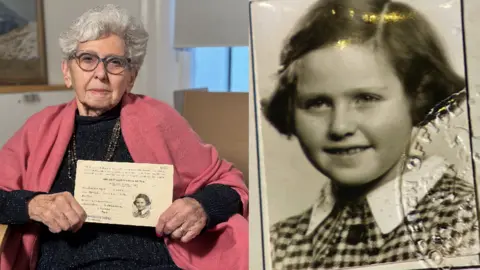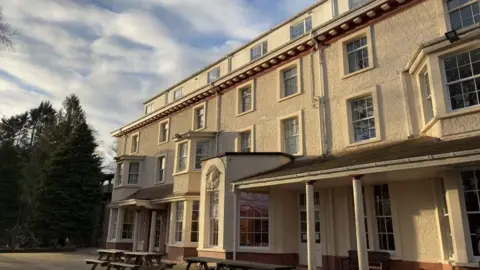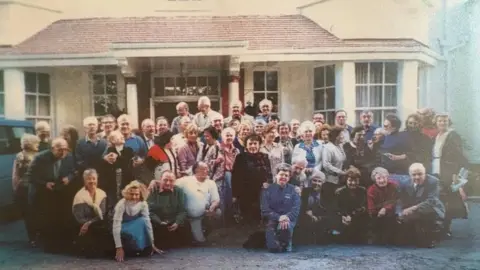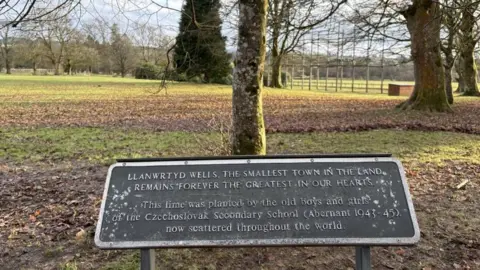I fled the Nazis and a tiny Welsh town became my home
 AJR / Dr Bea Lewkowicz / Lady Milena Grenfell-Baines
AJR / Dr Bea Lewkowicz / Lady Milena Grenfell-BainesA former child refugee has recalled how a small Welsh town became her "wonderful home" after she was forced to flee Czechoslovakia during World War Two.
Lady Milena Grenfell-Baines is one of the last remaining survivors of a group of around 140 children who arrived in Llanwrtyd Wells in Powys in 1943.
Now aged 95, she said the warm Welsh welcome she received could teach us lessons today.
This year's Holocaust Memorial Day marks 80 years since the liberation of Auschwitz-Birkenau - the largest Nazi extermination camp where more than a million people were murdered.
Before the age of nine, Lady Milena had a "perfectly normal" childhood until the Nazis occupied Czechoslovakia and Jews faced increasing persecution.
In 1939 she was one of the 669 children who escaped to Britain on Kindertransport trains organised by Sir Nicholas Winton.
She later became a pupil at the Czechoslovak State School set up in the Abernant Lake Hotel in Llanwrtyd Wells in 1943.
Remembering her arrival, she said: "The village had hardly seen any London people, never mind foreigners from Western Europe, so we had to introduce ourselves.
"We gave a concert to the local people and we sang lots of Czech songs but we finished off by singing Mae Hen Wlad fy Nhadau [the Welsh national anthem].
"From that day we were adopted. We all knew everybody and everybody knew us - it was great."

Remembering her time at what's considered to be Britain's smallest town brought back "happy emotions" for Lady Milena.
"We were always made to feel very welcome.
"We were like a big family... and it just became a wonderful home to all of us."
One local she remembers fondly was a shop owner called Joe Jones who would often help the children by driving them to nearby towns for sports matches.
She said that after the school closed in 1945, most of the children who returned to the Czech Republic discovered that their parents had died in concentration camps.
Lady Milena herself had family that died in the Holocaust, but fortunately her parents also managed to flee to England.
'Life-long friends'
Llanwrtyd Wells later twinned with the Czech town of Český Krumlov, further cementing ties between the two communities.
"It's a lovely link to have after all the years," added Lady Milena.
Several current residents warmly recall meeting the former pupils during their visits and anecdotes from their time in the town.
One was how members of the strong Welsh-speaking community made sure they switched to English whenever the pupils entered shops.
Deputy Mayor Jim Davies said he often gets put in touch with their families who visit and takes them around different spots in Llanwrtyd.
"I'm very proud of the connection. It's a wonderful achievement really... and it's very important to the town," he said.
 Manor Adventure / Abernant Lake Hotel
Manor Adventure / Abernant Lake HotelAfter leaving Llanwrtyd, Lady Milena moved to Preston, Lancashire, and eventually fell in love and had two children with her late husband, architect George Grenfell-Baines.
But the Welsh town has kept a special place in her heart.
She first returned in 1958 and has made a further seven trips - including with her children and other family members.
She organised two reunions in the early '90s, with former pupils attending from all over the world, including France and America.
"It was quite a while before I returned but once I did, people remembered us and they used to put the Czech flag out whenever the Czech visitors came," she said.
During one of visits they erected a plaque saying: "Llanwrtyd Wells, the smallest town in the land, remains the greatest in our hearts."
And in 1985 they presented the first solid gold link for the mayoral chain to the then mayor - Bryn Jones - and all the children were given the Freedom of the Town.
"We have made life-long friends [there]... it's high time I returned actually," she said.

Lady Milena has dedicated the last 15 years to sharing her testimony through working with the Holocaust Educational Trust.
One of her main messages is to encourage others to be kind and help those in need.
"It's so important that people learn what happened to us as children.
"How we were welcomed and looked after, not as refugees, somebody to beware of, but to be cared for.
"And I think some of us that are still here, are very much aware of how much of that is needed today."
